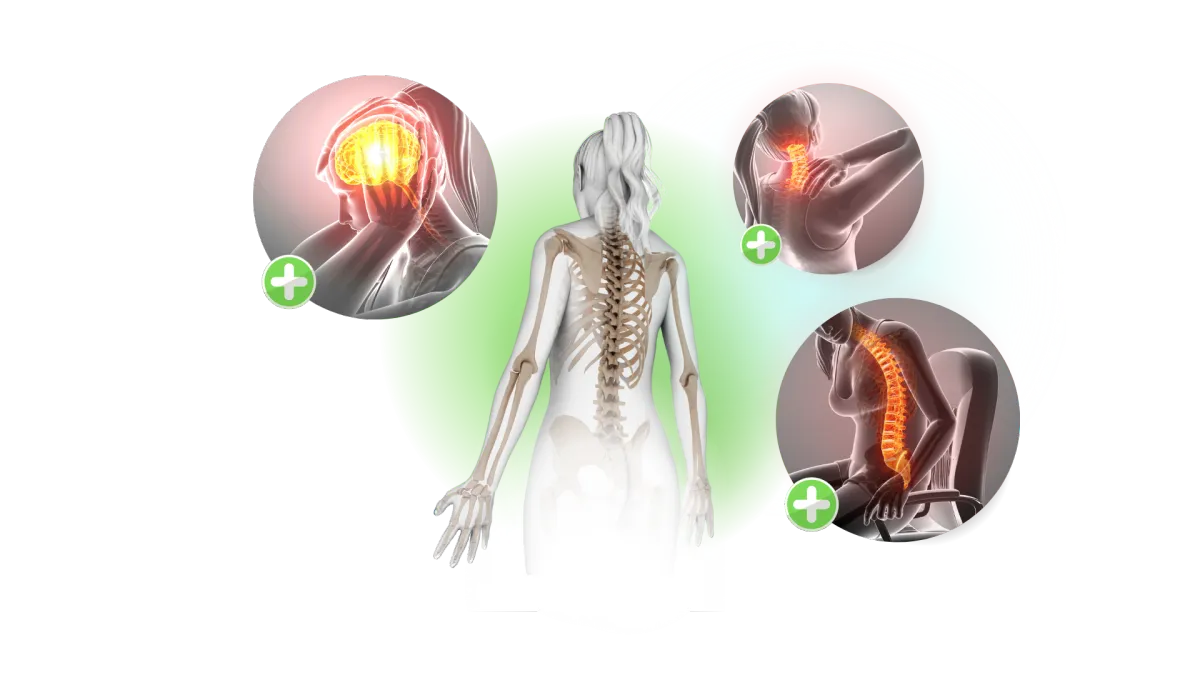Gentle Chiropractic Care in Penrith | Helping You Move Better and Feel More Confident
We help people with persistent back or neck pain move more freely, regain confidence, and get back to doing the things they love — gently, safely, and without forceful “cracking.”
About Your Penrith Chiropractor
At Your Spinal Health in Penrith, we specialise in gentle, low-force chiropractic care.
Our aim is simple: reduce pain, improve movement, and support your body’s natural healing.
Most people follow a short, structured plan over around 12 weeks and notice steady progress.
Everyone’s different, and results always vary — that’s why your care starts with a personalised Spinal Health Assessment.
Peter Bennett – Chiropractor
Registered with the General Chiropractic Council (Reg No: 01124)
Member of the United Chiropractic Association
Your Spinal Health
Registered chiropractic care in Penrith, Cumbria
5 Poets Walk, Penrith CA11 7HJ · 01768 899 036
Your Trusted Spinal Health Experts
At Your Spinal Health, we are passionate about helping you achieve your best health and well-being. We have been serving our community for over 20 years with a commitment to providing the highest quality care.
Combining natural hands-on treatment with our week-on-week progressive system to help symptoms like back pain, neck pain and headaches.

Start NOW. Just 1-click away
We help people feel safer and more confident moving again.
Save On Your Treatment Costs
Each visit is £50.
Save if you choose to pre pay.

Start NOW. Just 1-click away
Our clients tell us they can do more of what they enjoy once their pain is under control. Everyone’s different, and results vary.
Peter Bennett, Chiropractor – Registered with the General Chiropractic Council (Reg. No: 01124)
I'm Peter Bennett!
Hello, I’m Peter Bennett, a chiropractor based in Penrith, Cumbria.
I’ve spent more than 25 years helping people reduce pain, move better, and get more life back into their years.
My approach is gentle — no cracking, no heavy-handed adjustments — just safe, effective techniques that work with your body instead of against it.
Over the years, I’ve learned that the human body is incredibly good at trying to heal itself. My job is simply to understand what it’s trying to do and give it the right support.
People come to see me for all sorts of reasons — stiff backs after gardening, neck pain from long hours at a desk, or just feeling less steady than they used to.
Whatever brings you in, my goal is the same: to help you move more easily and feel more confident doing the things you love.
I believe great healthcare starts with kindness, clear explanations, and respect for each person’s pace. You’ll never be rushed or pressured here — just guided gently toward better movement and lasting results.
When I’m not in clinic, I’m usually outdoors walking in the fells, writing about longevity science, or creating online programs that help people stay active and independent later in life.

Why I Do This
When I first started in chiropractic, I thought the job was all about fixing spines.
But over the years, I’ve realised it’s really about helping people trust their bodies again.
I’ve seen how back pain can slowly chip away at someone’s confidence — the way they move, work, even how they laugh. One day it’s just a niggle, and before long it’s changed how they live. Helping someone turn that around, gently and safely, is still the best part of my week.
I’ve always believed the body isn’t broken — it’s doing its best to protect you. My role is to understand what it’s trying to do and guide it back toward balance. That might mean easing tension in the spine, retraining movement, or simply helping you breathe a little easier.
What keeps me going is seeing people realise they can do more than they thought — walking the fells again, picking up grandchildren, or just waking up without that constant stiffness.
It’s those moments that remind me why I chose this path all those years ago.
My aim has never been just to treat backs — it’s to help people move freely, live fully, and enjoy their years with confidence.
FAQS
What conditions can we help with?
Spinal health care can help a wide range of conditions, including back and neck pain, headaches, sciatica, joint pain, and even issues related to posture. It's not just about addressing the symptoms; it's about improving your overall health and well-being by improving the health of your spine and nervous system. If you have specific concerns or questions about your condition, please don't hesitate to ask for a consultation to discuss how spinal health care can benefit you.
Is spinal health care safe, and are the adjustments painful?
Spinal health care is generally considered safe when performed by trained professionals. The adjustments are typically not painful; in fact, many clients report feeling relief and improved mobility after an adjustment. Our therapists are highly skilled and will use gentle techniques tailored to your individual needs. Your comfort and safety are our top priorities, and we will explain every step of the process to ensure you feel at ease during your sessions.
How many visits will I need to see results?
The number of sessions you'll need depends on various factors, including the nature and severity of your condition, your overall health, and your treatment goals. Some clients experience relief after just a few sessions, while others may require more ongoing care. During your initial Spinal Health Assessment, we will assess your specific situation and provide a personalised treatment plan. Our goal is to provide efficient and effective care, so you can return to a pain-free and healthy lifestyle as soon as possible.
When should I see my doctor instead of a chiropractor?
Most back or neck problems are mechanical and respond well to gentle chiropractic care.
See your GP or call NHS 111 if you have fever, weight loss, cancer history, night sweats, recent trauma, numbness in the saddle area, bladder or bowel changes, severe unrelenting pain, or sudden weakness.
Call 999 immediately if you notice stroke signs —
Face drooping, Arm weakness, Speech changes, Time to call 999 (FAST) — or sudden dizziness, vision loss, or a severe new headache.
If you’re unsure, call us — we’ll help you decide the safest next step.
Latest Articles on Spinal Health

Your Spine Is Stronger Than Steel | Your Spinal Health
Did you know that your spine, when it’s healthy and properly aligned, can support more weight per inch than a steel column?
That’s right — the structure running down your back is one of nature’s engineering masterpieces.
But here’s the catch:
Your spine’s strength depends on its alignment, movement, and hydration.
Without those, even a small strain — lifting a bag awkwardly or sitting slouched for too long — can set off pain that seems to come from nowhere.
The Hidden Strength of Your Spine
Your spine isn’t a single bone — it’s 24 movable vertebrae, plus the sacrum and coccyx at the base.
Between those bones sit discs — soft, fluid-filled cushions that absorb shock and allow flexibility.
When everything’s aligned and moving well, your spine acts like a spring-loaded suspension system.
It carries your weight easily, absorbs bumps and twists, and keeps your nerves protected and your posture upright.
But when joints stiffen, muscles tighten, or discs dry out, that spring system begins to jam.
It’s a bit like rust in a bicycle chain — small at first, but it adds friction and eventually weakens the whole structure.
Why Movement Matters
Your spinal discs don’t have a direct blood supply — they rely on movement to draw in nutrients and push out waste.
So every time you twist, bend, or walk, you’re literally feeding your spine.
That’s why sitting still for hours at a time is so damaging.
No movement means no nourishment — and discs begin to dry out and lose resilience.
Over time, that can lead to stiffness, muscle strain, or nerve irritation.
The Role of Posture and Hydration
Just like your skin and muscles, your spinal discs are mostly water — about 80% when you’re young.
As you age, or if you’re dehydrated, they lose some of that fluid.
That’s one reason people often feel “shorter” at the end of the day!
Staying hydrated helps, but so does keeping your spine in a healthy alignment.
When the vertebrae are well positioned, discs can absorb and release fluid efficiently — keeping your spine strong, flexible, and pain-free.
A Simple Daily Habit
Here’s something you can do right now to help your spine stay strong:
👉 Every hour, stand up, stretch tall, and gently twist side to side.
It only takes 20 seconds.
You’ll get blood flowing, discs rehydrating, and muscles releasing tension.
Do that consistently, and you’ll notice less stiffness, better posture, and more energy at the end of the day.
The Bottom Line
Your spine really is stronger than steel — but only if you look after it.
A healthy spine is built on movement, alignment, and care.
Neglect it, and even “normal” activities can start to feel like hard work.
So if your back’s been feeling tight, achy, or weak lately, don’t ignore it.
Your spine is talking — and it’s easier to keep it strong than to rebuild it once it’s struggling.
Take the next step:
👉 Book a Spinal Health Assessment to check how well your spine is moving and learn what you can do to keep it strong, flexible, and pain-free.
All advice is general and educational. Always seek professional assessment for persistent or worsening symptoms.

Email [email protected]
Your Spinal Health – Chiropractic Care in Penrith, Cumbria
Peter Bennett – Chiropractor (Reg. No: 01124)
Registered with the General Chiropractic Council and Member of the United Chiropractic Association.
This website provides general information only and is not a substitute for personal professional advice. Results vary between individuals.
If you experience severe or worsening symptoms — especially weakness, numbness, or bladder/bowel changes — seek urgent medical attention.
